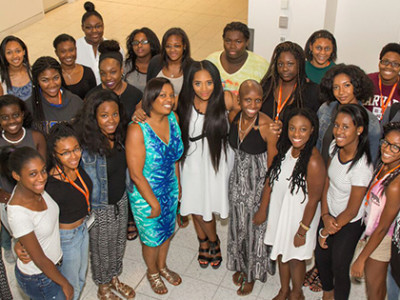 In May, The Rollins School of Public Health at Emory University (RSPH), Sophie’s Voice Foundation (SVF), and Emory University School of Medicine Department of Pediatrics announced the establishment of The Center for Spina Bifida Research, Prevention and Policy (CSB). The primary goal of the Center will be the total, global prevention of folic-acid preventable spina bifida over the next 10 years. The Center will also create programs to help advance the quality of life for individuals living with spina bifida, including individuals transitioning from pediatric to adult care.
In May, The Rollins School of Public Health at Emory University (RSPH), Sophie’s Voice Foundation (SVF), and Emory University School of Medicine Department of Pediatrics announced the establishment of The Center for Spina Bifida Research, Prevention and Policy (CSB). The primary goal of the Center will be the total, global prevention of folic-acid preventable spina bifida over the next 10 years. The Center will also create programs to help advance the quality of life for individuals living with spina bifida, including individuals transitioning from pediatric to adult care.
Spina bifida, a neural tube birth defect, is one of the most complex birth defects compatible with life. Sophie’s Voice Foundation, was founded in 2008 by actors Boris Kodjoe and Nicole Ari Parker in honor of their daughter Sophie who was diagnosed with Spina Bifida at birth. The news hit hard, but through consulting with various specialists and by educating themselves they found a way to address their daughter’s needs and provide her with the best care and treatment available today. The acting duo have been huge advocates for this cause including embarking on a fundraising goal of $2 million.
In the United States, the annual cost of care and treatment of persons with this birth defect is estimated at a staggering $1.4 billion. Dr. William F. Foege, author and senior fellow with The Bill and Melinda Gates Foundation and professor emeritus at RSPH said, “The Center for Spina Bifida Research, Prevention and Policy is working toward prevention of spina bifida across the globe. Based on the successful prevention efforts in North America, within a decade or so, we can totally prevent this birth defect and improve the lives of children and adults.”
 Internationally, prevention efforts for spina bifida have achieved only 20 percent of what is possible with proper daily consumption of folic acid. Worldwide, more than 325,000 babies are born annually with neural tube birth defects – and 75 percent of these births defects could have been prevented with folic acid. The Center for Spina Bifida Research, Prevention and Policy will collaborate with the Centers for Disease Control and Prevention’s National Center for Birth Defects and Developmental Disabilities, the Flour Fortification Initiative and other international public, private, nonprofit and academic sectors in seeking its goal of achieving total prevention of folic acid preventable spina bifida by 2022.
Internationally, prevention efforts for spina bifida have achieved only 20 percent of what is possible with proper daily consumption of folic acid. Worldwide, more than 325,000 babies are born annually with neural tube birth defects – and 75 percent of these births defects could have been prevented with folic acid. The Center for Spina Bifida Research, Prevention and Policy will collaborate with the Centers for Disease Control and Prevention’s National Center for Birth Defects and Developmental Disabilities, the Flour Fortification Initiative and other international public, private, nonprofit and academic sectors in seeking its goal of achieving total prevention of folic acid preventable spina bifida by 2022.
“The Center for Spina Bifida Research, Prevention and Policy will provide an infrastructure and the resources to develop and implement a comprehensive plan seeking to prevent almost all new cases of spina bifida by 2022 – 30 years after CDC published the U.S. Public Health Service recommendation that all women of reproductive age should consume 400 micrograms of folic acid to prevent spina bifida and other neural tube defects,” said Dr. Godfrey P. Oakley, the Center’s director and a professor of epidemiology at RSPH.
Initial research will include epidemiologic research on deaths of young adults with spina bifida, seeking to identify preventable causes, and research focused on the use of anticonvulsant drugs that have been found to increase the risk of neural tube defects. The Center will also be active in research seeking also to provide the scientific foundation for the elimination of vitamin B12 deficiency diseases. CSB is based at the Rollins School of Public Health at Emory University and will have employees based in countries worldwide. The Center, a 10-year $50 million initiative, has the goal of the total global prevention of folic-acid spina bifida by 2022.





